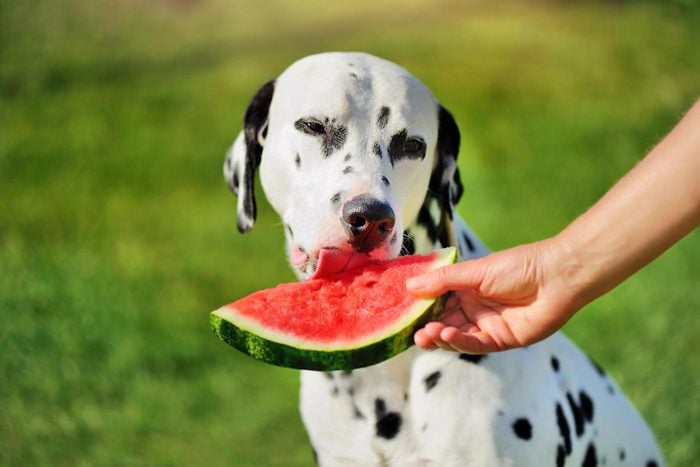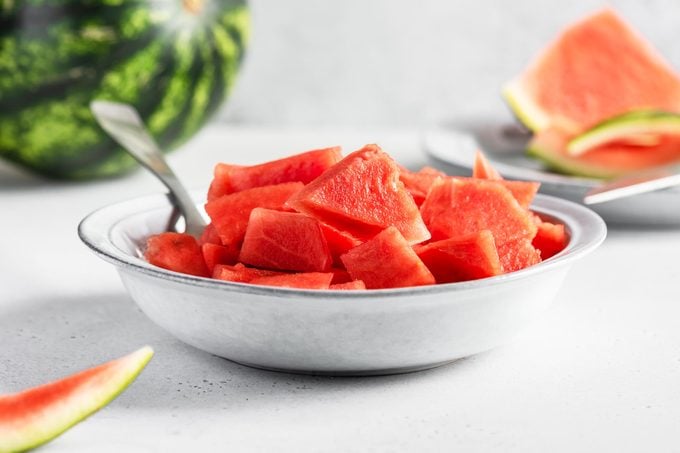Can Dogs Eat Watermelon? Here’s What Vets Say
Updated: Mar. 13, 2024

It's one of summer's favorite treats. But is that slice of watermelon safe to share with your dog? We asked the experts.
Nothing says summer like a plateful of fresh watermelon. It’s the perfect cap to a backyard barbecue and an easy snack for steamy afternoons. But if you’ve got a dog in the family, good luck enjoying that slice of red deliciousness all by yourself. Chances are, you’ll soon be staring down a serious case of puppy-dog eyes. “Dogs always want whatever you’re eating,” says Jennifer Hawkins, DVM, executive director of the Southern California Veterinary Medical Association. “And watermelon is no exception.”
But can dogs eat watermelon? Any good pet parent knows there are lots of human foods that dogs can eat … and almost as many foods dogs can’t eat. And when it comes to fruits and vegetables dogs can and can’t eat, the answers aren’t always obvious. Can dogs eat bananas? Yes. Can they have grapes? Definitely not. So what does that mean for watermelon? We asked the experts why dogs seem to love watermelon so much—and whether or not it’s safe to share it with them.
Get Reader’s Digest’s Read Up newsletter for more pet tips, humor, cleaning, travel, tech and fun facts all week long.
Why do dogs love watermelon?
Dogs love watermelon for the same reasons we do. “It’s sweet and refreshing,” says Amy Tate, DVM, co-owner of the Riverview Animal Clinic in Birmingham, Alabama. “On a hot summer day, it’s hydrating and it cools the body.” But there’s also something about the texture of watermelon that seems especially appealing to our canine friends, says Dr. Hawkins. “It has a little bit of crunch with the sweetness.”
Can dogs eat watermelon?
With a couple of precautions, yes! Watermelon is perfectly safe to give to dogs and can actually be a healthy treat for them. “It’s got a lot of antioxidants and other beneficial substances in there,” says Dr. Tate. “It’s also fairly low in calories (about 46 calories a cup) and has a lot of fiber, so if you have a dog that’s trying to lose some weight, it’s a good go-to treat.”
But while the red watermelon flesh is fine for dogs, it’s important to know that the fruit’s hard seeds and fibrous rind can be dangerous. “I always recommend seedless watermelon,” says Dr. Hawkins. “Sometimes seeds can cause a little tummy upset, and in some dogs, it can even cause a slowdown or an obstruction of the gut.” Note: Those little fibrous white seeds you often find in seedless watermelon are fine; it’s the large, harder seeds you need to watch out for.
Watermelon rinds can also be troublesome. “While some dogs might be able to tolerate it, I can’t tell you how many dogs will eat the whole rind in one piece, and then we see that as an obstruction that doesn’t pass,” says Dr. Hawkins. “It becomes a very expensive watermelon when we have to go in surgically to remove it.”
How to feed your dog watermelon

The best way to feed your dog watermelon is to remove the rind and any hard seeds, then cut the flesh into bite-sized pieces. “Some dogs inhale without actually chewing,” says Dr. Hawkins, “so I try to keep them small. I think of the small pieces I used to have to cut for my child.”
Of course, some dogs have been known to take matters into their own paws and steal a piece of watermelon when their owners aren’t looking. If you find that your dog just wolfed down an entire slice of watermelon—rind, seeds and all—don’t panic. In most cases, it will all pass through his digestive tract just fine. “Dogs’ stomach acid is much higher than ours,” says Dr. Tate. But if you notice that your dog is not eating, is vomiting or is showing any other signs of gastrointestinal distress, consult your vet.
How much watermelon can a dog eat?
While dogs can eat watermelon, eating too much watermelon can be a different story. “Just like anything, you want to try not to overdo it,” says Dr. Tate. “If they eat more watermelon than they should, they can get diarrhea from the excess fluid. There can also be a lot of sugar in watermelon, and it can change the pH of the gastrointestinal tract.”
So how much is too much? As a rule of thumb, Dr. Tate suggests no more than 2 to 3 cups for larger-breed dogs, 1 to 2 cups for medium-breed dogs and 1 cup for small breeds. “You want to keep it within reasonable limits,” she says.
Are there any fruits dogs can’t eat?
Some fruits, like bananas, cantaloupes and apples, are vitamin-packed treats for humans and dogs alike—but other fruits can actually be dangerous for our canine pals. Among the fruits dogs shouldn’t eat:
- Grapes. “Both red and green grapes, as well as raisins, have a compound in them that in certain quantities can cause acute renal injury and kidney disease in dogs,” says Dr. Tate. “I just tell people to stay away from them.”
- Cherries. Cherry stems and leaves contain cyanide compounds, which can be deadly if consumed in large quantities. But the real danger is the pits. “I advise people to avoid any fruit with pits, which can cause intestinal blockages if eaten,” says Dr. Hawkins. (And no, maraschino cherries aren’t appropriate dog treats either. Although their pits are removed, they are high in sugar.)
- Avocados. The skin, pits and flesh of avocados contain the toxin persin, which, while not harmful to humans, can cause stomach upset in dogs, says Dr. Hawkins.
- Citrus fruits. While slipping your dog an occasional slice of a peeled orange is probably fine, orange peels and seeds can also cause gastrointestinal upset. Plus, according to Dr. Tate, “citrus fruits also tend to be high in sugar, and they can cause calcium deposits in certain dogs.” Why is the extra calcium concerning? It may lead to the production of urine crystals and potentially cause stones in the bladder.
- Mangoes. “Mangoes tend to have a high sugar content,” says Dr. Tate. “They can also have some excess copper, which gets stored in the liver and can trigger cellular damage over time.”
In general, even when dogs can eat fruits like watermelon and the others listed above, keep in mind that “any time you’re giving your dog a food that’s not their normal diet, there can always be a risk of a little tummy upset,” says Dr. Hawkins. “And different dogs respond to things differently. I always recommend checking with your vet about your particular dog.”
For a quick yes or no, however, check out these stories on whether it’s safe for pups to eat hot dogs.
About the experts
- Jennifer Hawkins, DVM, is the executive director of the Southern California Veterinary Medical Association in Cypress, California.
- Amy Tate, DVM, is the co-owner and managing partner of Riverview Animal Clinic in Birmingham, Alabama.



